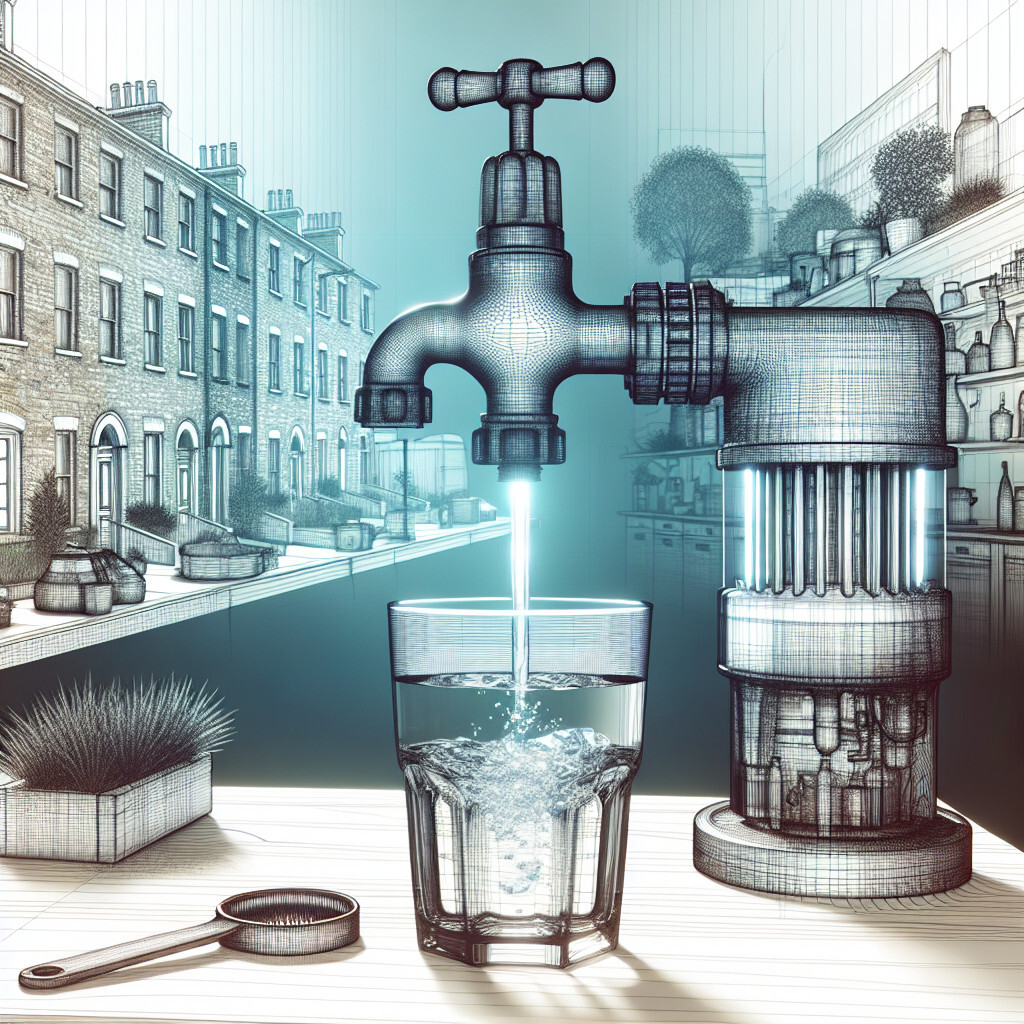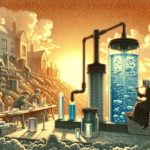-
Table of Contents
“UK Tap Water: Ensuring Purity Through Filtration”
Introduction

In the UK, tap water is generally safe to drink as it undergoes rigorous treatment to meet strict quality standards. However, the question of whether you should filter tap water in the UK is a topic of discussion due to factors such as taste, potential traces of chemicals, and individual health concerns. While some people prefer the taste of filtered water, others may choose to filter their water to remove any residual substances like chlorine, heavy metals, or pesticides. Therefore, the decision to filter tap water in the UK is largely dependent on personal preference and specific health considerations.
Understanding the Importance of Filtering Tap Water in the UK
In the United Kingdom, the quality of tap water is generally high, thanks to stringent regulations and rigorous testing by water companies. However, despite these measures, the question of whether or not to filter tap water remains a topic of considerable debate. This article aims to shed light on the importance of filtering tap water in the UK, providing a comprehensive understanding of the subject.
The UK’s tap water is primarily sourced from surface water such as rivers and reservoirs, and groundwater from wells and boreholes. Before it reaches our taps, it undergoes a series of treatments to remove impurities and harmful substances. These treatments include coagulation, sedimentation, filtration, and disinfection. Despite these processes, some contaminants may still find their way into the water supply. These can include heavy metals like lead, chemicals such as pesticides, and microorganisms like bacteria and viruses.
One of the primary reasons for filtering tap water is to remove these potential contaminants. While the levels of these substances are typically low and within legal limits, some people may still prefer to take extra precautions to ensure the purity of their drinking water. This is particularly relevant for individuals with compromised immune systems, who may be more susceptible to the effects of these contaminants.
Moreover, the process of disinfection, which is crucial for killing harmful microorganisms, often involves the use of chlorine. While this substance is effective in eliminating bacteria and viruses, it can also give the water an unpleasant taste and odour. A water filter can help to remove this chlorine, improving the taste and smell of the tap water.
Another reason to consider filtering tap water is the potential presence of limescale. In many parts of the UK, the water is ‘hard’, meaning it has high levels of calcium and magnesium. These minerals can lead to the build-up of limescale in kettles and other appliances, which can affect their performance and lifespan. A water filter can help to reduce the hardness of the water, preventing limescale build-up and prolonging the life of your appliances.
However, it’s important to note that not all water filters are created equal. Different types of filters are designed to remove different types of contaminants. For example, activated carbon filters are effective at removing chlorine and improving taste and odour, but they may not be as effective at removing heavy metals or microorganisms. On the other hand, reverse osmosis filters can remove a wide range of contaminants, but they can also remove beneficial minerals from the water.
In conclusion, while the tap water in the UK is generally safe to drink, filtering it can provide additional peace of mind by removing potential contaminants. It can also improve the taste and smell of the water, and help to prevent limescale build-up in appliances. However, it’s important to choose a filter that is suited to your specific needs and concerns. As always, it’s advisable to consult with a water quality expert or a healthcare professional if you have any concerns about your tap water.
Should You Filter Your Tap Water in the UK? A Comprehensive Guide
In the United Kingdom, the quality of tap water is generally high, thanks to stringent regulations and rigorous testing by water companies. However, the question of whether or not to filter tap water is one that often arises, and the answer is not as straightforward as one might think. This article aims to provide a comprehensive guide on the subject, exploring the reasons why you might consider filtering your tap water in the UK.
Firstly, it’s important to understand that while UK tap water is safe to drink, it’s not entirely free from impurities. The water that comes out of your tap has travelled through miles of pipes, picking up small amounts of minerals, metals, and other substances along the way. These can include calcium and magnesium (which cause water hardness), chlorine (used for disinfection), and trace amounts of metals like copper and lead. While these are typically present at safe levels, some people may prefer to remove them for reasons of taste, health, or both.
The taste of tap water can vary significantly depending on where in the UK you live. This is largely due to the different levels of minerals in the water, which can give it a distinct flavour. Some people find that filtering their water improves its taste, making it more similar to bottled water. If you’re sensitive to the taste of chlorine or minerals in your water, a filter could be a worthwhile investment.
Health considerations are another reason why some people choose to filter their tap water. While the levels of substances like chlorine and metals in UK tap water are regulated to be safe, some people may be more sensitive to these substances than others. For example, those with certain health conditions, pregnant women, and young children may be advised to filter their water as a precautionary measure. Additionally, some people may choose to filter their water to remove any potential contaminants that could be present due to issues with their home’s plumbing.
However, it’s important to note that not all water filters are created equal. Different types of filters are designed to remove different types of contaminants, so it’s crucial to choose a filter that’s suited to your specific needs. For example, activated carbon filters are effective at removing chlorine and improving taste, but they won’t remove minerals or metals. On the other hand, reverse osmosis filters can remove a wider range of substances, but they also remove beneficial minerals and can be more expensive to install and maintain.
In conclusion, whether or not you should filter your tap water in the UK depends on a variety of factors, including your personal taste preferences, health considerations, and the quality of your home’s plumbing. While UK tap water is generally safe to drink, filtering can provide additional peace of mind and improve the taste of your water. However, it’s important to choose a filter that’s appropriate for your needs and to maintain it properly to ensure its effectiveness. As always, if you have any concerns about your water quality, it’s best to consult with a professional or your local water company.
The Pros and Cons of Filtering Tap Water in the UK
In the United Kingdom, the quality of tap water is generally high, thanks to stringent regulations and rigorous testing. However, the question of whether or not to filter tap water is a topic of ongoing debate. This article aims to explore the pros and cons of filtering tap water in the UK, providing a balanced perspective to help you make an informed decision.
On the one hand, filtering tap water can offer several benefits. Firstly, it can improve the taste and odour of the water. While UK tap water is safe to drink, it can sometimes have an unpleasant taste or smell due to the chlorine used in the disinfection process. A water filter can remove these impurities, resulting in a cleaner, fresher taste.
Secondly, water filters can remove certain contaminants that may still be present in tap water. Although UK water companies are required to meet strict safety standards, trace amounts of substances such as lead, copper, and certain pesticides can still make their way into the water supply. A good quality water filter can effectively remove these contaminants, providing an extra layer of protection for your health.
Thirdly, filtering tap water can be more environmentally friendly than buying bottled water. Plastic water bottles contribute significantly to pollution and waste, whereas a water filter can provide clean, safe drinking water without the environmental impact.
However, there are also some potential downsides to consider. One of the main drawbacks of filtering tap water is the cost. While the initial outlay for a water filter may not be substantial, the ongoing cost of replacement filters can add up over time. It’s also worth noting that not all water filters are created equal – some are more effective than others at removing contaminants, and the quality can vary widely.
Another potential disadvantage is the maintenance involved. Water filters need to be cleaned and replaced regularly to ensure they continue to work effectively. This can be time-consuming and inconvenient, particularly for busy households.
Furthermore, while water filters can remove certain contaminants, they can also remove beneficial minerals such as calcium and magnesium. These minerals are not only essential for our health, but they also contribute to the taste of the water. Therefore, using a water filter could result in water that is less nutritious and potentially less palatable.
In conclusion, the decision to filter tap water in the UK is a personal one, and there are valid arguments on both sides. If you’re concerned about the taste or quality of your tap water, or if you want to reduce your environmental impact, a water filter could be a worthwhile investment. However, it’s important to consider the ongoing costs and maintenance involved, as well as the potential loss of beneficial minerals. As always, it’s advisable to do your research and choose a filter that meets your specific needs and preferences.
Exploring the Health Implications of Not Filtering Tap Water in the UK
In the United Kingdom, the quality of tap water is generally high, thanks to stringent regulations and rigorous testing by water companies. However, the question of whether or not to filter tap water is one that continues to be debated. This article aims to explore the health implications of not filtering tap water in the UK.
The UK’s tap water is among the cleanest in the world, meeting strict safety standards set by the European Union. It is tested for a wide range of substances, including bacteria, viruses, chemicals, and metals. Despite this, some people choose to filter their tap water, believing it to be a healthier option. But is this really necessary?
One of the main reasons people choose to filter their tap water is to remove chlorine. Chlorine is added to tap water to kill harmful bacteria and other microorganisms. While it is effective in ensuring the water is safe to drink, some people are sensitive to its taste and smell. Moreover, there are concerns about the long-term health effects of consuming chlorinated water. Some studies suggest a link between chlorinated water and an increased risk of bladder and colorectal cancer, although the evidence is not conclusive.
Another reason for filtering tap water is to remove trace amounts of metals and other contaminants. While the levels of these substances in UK tap water are well below the limits set by the EU, some people prefer to err on the side of caution. For instance, lead can leach into tap water from old pipes, and long-term exposure to even low levels of lead can have harmful effects on health, particularly in children.
However, it’s important to note that not all water filters are created equal. Some remove a wide range of contaminants, while others only remove specific ones. Moreover, some filters can remove beneficial minerals from the water, such as calcium and magnesium, which are essential for good health. Therefore, if you choose to filter your tap water, it’s important to select a filter that suits your specific needs and to maintain it properly to ensure its effectiveness.
On the other hand, not filtering tap water does not necessarily pose a health risk. The UK’s water companies are required to regularly test the water supply and to take action if any contaminants are found at levels that could pose a risk to health. Moreover, tap water contains fluoride, which helps to prevent tooth decay. Some water filters can remove fluoride, so if you choose to filter your tap water, you may need to find other ways to get enough fluoride.
In conclusion, whether or not to filter tap water in the UK is largely a matter of personal preference. If you are concerned about the taste or smell of your tap water, or if you are particularly sensitive to certain substances, filtering your water may be a good option. However, it’s important to remember that the UK’s tap water is rigorously tested and generally safe to drink. If you have specific health concerns, it may be worth discussing them with a healthcare professional or a water quality expert.
Q&A
1. Question: Is it necessary to filter tap water in the UK?
Answer: No, it is not necessary to filter tap water in the UK as it is among the highest quality in the world and is safe to drink straight from the tap.
2. Question: What are the benefits of filtering tap water in the UK?
Answer: Filtering tap water can improve the taste by removing chlorine and other chemicals. It can also remove any potential harmful contaminants that may be present in small amounts.
3. Question: Are there any risks associated with not filtering tap water in the UK?
Answer: The risks are minimal as UK tap water is highly regulated and tested for safety. However, in some areas, tap water may contain higher levels of certain minerals or metals, which some people may prefer to filter out.
4. Question: What types of water filters are recommended for use in the UK?
Answer: Activated carbon filters, reverse osmosis systems, and jug filters are commonly used in the UK. The choice depends on individual preferences and specific water quality concerns.
Conclusion
In conclusion, it is generally safe to drink tap water in the UK as it is strictly regulated. However, filtering tap water can further improve the taste and remove any potential impurities, so it can be considered as an additional precautionary measure, especially for those with a sensitive immune system.






